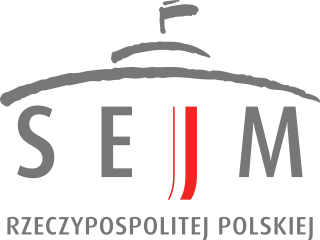
The Sejm of the Republic of Poland is the lower house of the Polish parliament. It consists of 460 deputies elected by universal ballot and is presided over by a speaker called the "Marshal of the Sejm of the Republic of Poland". In the Kingdom of Poland, "Sejm" referred to the entire two-chamber parliament of Poland, comprising the Chamber of Envoys, the Senate and the King. It was thus a three-estate parliament. Since the Second Polish Republic (1918–1939), "Sejm" has referred only to the larger house of the parliament; the upper house is called the Senat Rzeczypospolitej Polskiej.
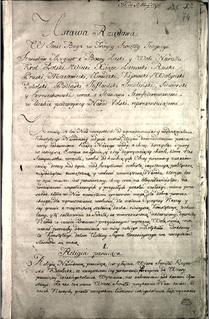
The Constitution of 3 May 1791, was a constitution adopted by the Great Sejm for the Polish–Lithuanian Commonwealth, a dual monarchy comprising the Crown of the Kingdom of Poland and the Grand Duchy of Lithuania. The Constitution was designed to correct the Commonwealth's political flaws and had been preceded by a period of agitation for—and gradual introduction of—reforms, beginning with the Convocation Sejm of 1764 and the consequent election that year of Stanisław August Poniatowski as the Commonwealth's last king.
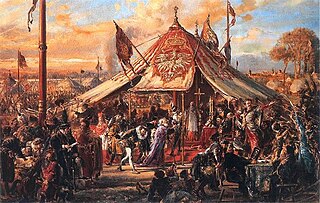
Golden Liberty, sometimes referred to as Golden Freedoms, Nobles' Democracy or Nobles' Commonwealth was a political system in the Kingdom of Poland and, after the Union of Lublin (1569), in the Polish–Lithuanian Commonwealth. Under that system, all nobles (szlachta), regardless of rank or economic status, were considered to have equal legal status and enjoyed extensive legal rights and privileges. The nobility controlled the legislature and the Commonwealth's elected king.

Tadeusz Reytan was a nobleman from the Polish–Lithuanian Commonwealth. He was a member of the Polish Sejm from the constituency of Nowogródek. Rejtan is remembered for a dramatic gesture he made in September 1773, as a deputy of the Partition Sejm. There, Rejtan tried to prevent the legalization of the first partition of Poland, a scene that has been immortalized in the painting Rejtan by Jan Matejko. He has been the subject of many other art works, and is a symbol of patriotism in Belarus and Poland. Despite his efforts, the partition of Polish–Lithuanian Commonwealth was legalized soon afterwards.

The liberum veto was a parliamentary device in the Polish–Lithuanian Commonwealth. It was a form of unanimity voting rule that allowed any member of the Sejm (legislature) to force an immediate end to the current session and to nullify any legislation that had already been passed at the session by shouting, Sisto activitatem! or Nie pozwalam!. The rule was in place from the mid-17th century to the late 18th century in the Sejm's parliamentary deliberations. It was based on the premise that since all Polish noblemen were equal, every measure that came before the Sejm had to be passed unanimously. The liberum veto was a key part of the political system of the Commonwealth, strengthening democratic elements and checking royal power and went against the European-wide trend of having a strong executive.
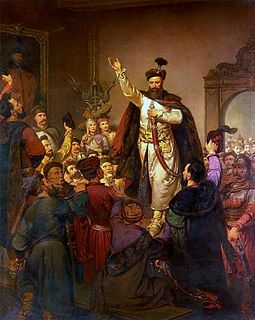
This article is about a legal concept, not a political union of territories (confederation), also known in Poland as "konfederacja".

The Great Sejm, also known as the Four-Year Sejm was a Sejm (parliament) of the Polish–Lithuanian Commonwealth that was held in Warsaw between 1788 and 1792. Its principal aim became to restore sovereignty to, and reform, the Commonwealth politically and economically.

Andrzej Maksymilian Fredro (c.1620–1679) was a Polish szlachcic and writer.

The Patriotic Party, also known as the Patriot Party or, in English, as the Reform Party, was a political movement in the Polish-Lithuanian Commonwealth in the period of the Four-Year Sejm of 1788–92, whose chief achievement was the Constitution of 3 May 1791. The reformers aimed to strengthen the ailing political machinery of the Commonwealth, to bolster its military, and to reduce foreign political influence, particularly that of the Russian Empire. It has been called the first Polish political party, though it had no formal organizational structure. The Party was inspired by the ideals of the French Revolution, and its name, proudly used by themselves, was a tribute to the Dutch Patriots.

The Familia was the name of an 18th-century Polish political faction led by the House of Czartoryski and allied families. It was formed towards the end of the reign of King of Poland Augustus II the Strong. The Familia's principal leaders were Michał Fryderyk Czartoryski, Grand Chancellor of Lithuania, his brother August Aleksander Czartoryski, Voivode of Ruthenia (Rus), their sister Konstancja Czartoryska,and their brother-in-law, Stanisław Poniatowski, Castellan of Kraków.
Lubomirski's rebellion or Lubomirski's rokosz, was a rebellion against Polish King John II Casimir, initiated by the Polish nobleman Jerzy Sebastian Lubomirski.
Silent Sejm is the name given to the session of the Sejm (parliament) of the Polish-Lithuanian Commonwealth of 1 February 1717 held in Warsaw. A civil war in the Commonwealth was used by the Russian Tsar Peter the Great as an opportunity to intervene as a mediator. It marked the end of Augustus II of Poland's attempts to create an absolute monarchy in Poland, and the beginning of the Russian Empire's increasing influence and control over the Commonwealth.

The general sejm was the bicameral parliament of the Polish–Lithuanian Commonwealth. It was established by the Union of Lublin in 1569 from the merger of the Sejm of the Kingdom of Poland and the Seimas of Grand Duchy of Lithuania, Ruthenia and Samogitia. It was one of the primary elements of the democratic governance in the Commonwealth. The sejm was a powerful political institution and the king could not pass laws without the approval of that body.
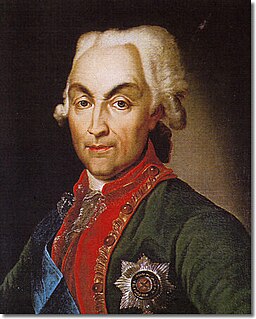
The Repnin Sejm was a Sejm of the Polish–Lithuanian Commonwealth that took place between 1767 and 1768 in Warsaw. This session followed the Sejms of 1764 to 1766, where the newly elected King of Poland, Stanisław August Poniatowski, attempted with some successes to push through reforms to strengthen the government of the Commonwealth. These reforms were viewed as dangerous by Poland's neighbors, who preferred a weak Commonwealth and did not want to see it threaten their own political and military aspirations. The Russian Empire sent ambassador Nicholas Repnin, who became the driving force behind the Sejm proceedings. The Repnin Sejm marked one of the important milestones in increasing Polish dependence on the Russian Empire, and turning it into a Russian protectorate. This dependent position was bluntly spelled out in Nikita Ivanovich Panin's letter to King Poniatowski, in which he made it clear that Poland was now in the Russian sphere of influence.

Władysław Wiktoryn Siciński was a member of the Polish–Lithuanian nobility and dignitary of the Polish–Lithuanian Commonwealth. Lord Master-of-the-Table and Lord Vice-Justice of Upytė, he was among the deputies of the Trakai Voivodeship nobility to the Sejm of the Polish–Lithuanian Commonwealth of 1652 which took place during the Khmelnytsky Uprising. He is credited with using the liberum veto for the first time in Polish history during the Sejm. Some historians have speculated that he might have acted on orders from Janusz Radziwiłł, though Wisner observed there is no evidence to support this theory.
The Convocation Sejm of 1764 was a session of the Sejm (parliament) of the Polish-Lithuanian Commonwealth. It took place in Warsaw from 7 May to 23 June, and was a confederated convocation sejm, tasked with preparing a new royal election to fill the throne of the Commonwealth. It carried out a series of reforms to the Commonwealth government.
The Cardinal Laws were a quasi-constitution enacted in Warsaw, Polish-Lithuanian Commonwealth, by the Repnin Sejm of 1767–68. Enshrining most of the conservative laws responsible for the inefficient functioning of the Commonwealth, and passed under foreign duress, they have been seen rather negatively by the historians.

The early modern era of Polish history follows the late Middle Ages. Historians use the term early modern to refer to the period beginning in approximately 1500 AD and lasting until around 1800.
Kazimierz Karwowski of Pniejnia was a Polish noble and politician. He was marshal of the Sejm in 1740, a deputy to the Crown Tribunal, cześnik of Wizna from 1703, stolnik, łowczy and pisarz of Bielsk, podstarości, podstoli and sędzia grodzki (judge) of Brańsk. He is best known as an advocate of reform, and as a deputy elected to the Sejm (parliament) of the Polish-Lithuanian Commonwealth a record number of times over his four decades as a Sejm deputy.

Stanisław Dunin-Karwicki, also known as Stanisław Karwicki-Dunin or Stanisław Karwicki, of the Łabędź coat of arms, was a Polish noble, politician, and political writer. He held the titles of Cześnik from 1688 and podkomorzy of Sandomierz from 1713 or 1714. He was involved with the Polish Reformed Church and was deputy to several Sejms. He authored the reformist treatise De ordinanda Republica seu de corrigendis defectibus in statu Republicae Polonae.














